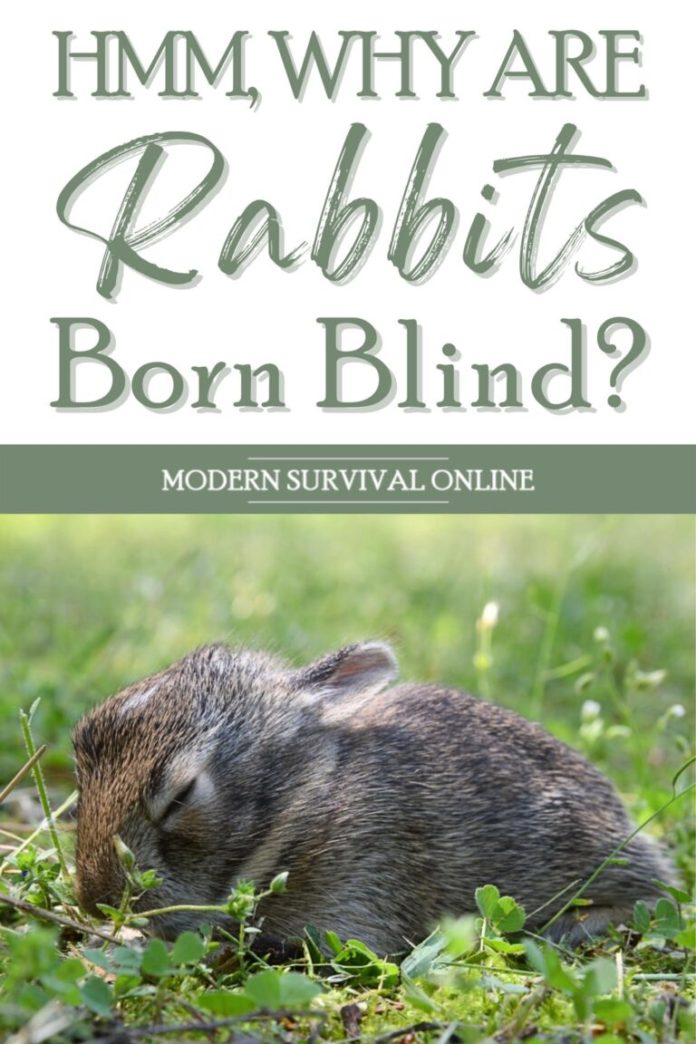If you have ever discovered a nest of baby bunnies in your yard, or perhaps you have raised your own, you likely noticed that their little eyes remain firmly shut for the first days of their lives, unable to see.

It is definitely adorable, but the little things seem so helpless. Despite our sentiments, there must be a reason for this in nature. So, why are rabbits born blind?
Rabbits are born blind with their eyelids shut because their eyes are still developing outside the womb, and will continue to develop after their eyes open at around 2 weeks old.
It is worth pointing out that, yes, bunnies really are as helpless as they appear. Though their eyes will open in time, the first few weeks of their lives are spent without sight.
Even after their eyes open, their vision has much developing to do before they are ready to venture into the world on their own. Keep reading to learn more about newborn rabbits and their vision.
Rabbits’ Eyes Still Need Time to Develop After Birth
When a baby bunny is born, its eyes are not ready to open and see the world just yet. The reason for this is that rabbits’ eyes continue to develop after they are born, outside of the womb.
In fact, their eyelids are actually sealed shut during this time, and they are unable to open them right away even if they wanted to. This additionally helps protect the eye from damage during a highly vulnerable time.
But don’t worry, their eyesight is on the “home stretch” and their eyes are soon to open.
It Takes About Two Weeks for Rabbit’s Eyes to Open
If you have ever bred rabbits yourself you were probably taken aback by how long the little bunnies’ eyes stay shut.
It is enough to make someone start to worry. Most of the time, there is nothing to worry about, thankfully, and you just need to be patient. A rabbit’s eyes will usually open when they are around two weeks old.
Some bunnies might open their eyes a little earlier, around 10 days old, and some might open them a bit later, even up to 3 weeks, but in general, 14 days is when you can expect their little eyes to open and start seeing the world.
Anything longer than that and you might have problems, however. More on that in a bit.
After Opening, Vision is Still Developing
Once their eyes finally open, they are still not able to see all that well. They can perceive light and shapes, but they won’t have great visual acuity or depth perception.
In fact, for the first few weeks, their vision is somewhat blurry. This is because their eyeballs are still developing during this time.
After a few more weeks have passed and their vision has had time to develop, rabbits will be able to see much better and will be able to start hopping around and exploring on their own with a much better view of their surroundings.
What if a Rabbit’s Eyes Don’t Open?
If a rabbit’s eyes do not open within two weeks or three at the very latest, this could be a sign of an underlying health condition.
Infections, injuries, malnutrition, and congenital defects can all cause a delay in eye-opening or even permanent impairment of vision, even blindness. In some cases, the eyes may never open at all and the rabbit may need to be euthanized.
Bunnies, even in the best of times, are vulnerable to all sorts of infections immediately prior to and after birthing, including of the eyes themselves.
If a mother rabbit is sick, this can also lead to developmental problems in her offspring.
Additionally, if a newborn bunny was injured during birth or delivery, this could stunt growth or cause damage to their developing eyes that might result in partial or total blindness.
Sometimes, inadequate nutrition can also lead to problems with a rabbit’s vision.
If a mother rabbit lacked the necessary nutrition during pregnancy or cannot supply her babies with enough milk after they are born, this can further stunt their development in a number of ways, including causing delays in eye-opening or ongoing vision problems.
Finally, some rabbits are simply born with congenital defects that prevent their eyes from developing properly or cause damage to the eyeballs themselves.
These conditions are often genetic and passed down through generations of rabbits and, sadly, there is no great way to predict or prevent them.
If your rabbit’s eyes have not opened by the time they are three weeks old, it is best to take them to a veterinarian for a checkup.
They will be able to determine if there is an underlying health condition causing the problem or if the rabbit is simply taking a bit longer to develop.
In either case, they will be able to offer guidance on the best course of treatment.
If the rabbit is blind or facing some other serious health complications, think carefully about whether or not you want to take on the challenges associated with caring for the animal. In nature, animals that are at such a disadvantage never make it.
Can You Tell If a Rabbit is Blind?
It is important to point out that even if a rabbit’s eyes open it might yet be blind. Problems with the optic nerve and other subtle but devastating defects can mean a bunny with bright, clear eyes is nonetheless blind. You need to know how to assess the issue to find out for sure.
The best way to test a rabbit’s vision is to place them in a room or area that they are not familiar with.
If they are able to orient themselves and find their way around without any trouble, then they likely have good vision.
If they seem disoriented or confused, bumping into things and seeing unsure, this could be a sign that they are having difficulty seeing or cannot see at all.
Similarly, rabbits will invariably show a flinch response when you make an explosive, sudden movement and especially from overhead. Try to give your rabbit a little startle and see if it flinches. If it does not, it is almost certain that it is blind.
Never, Ever Attempt to Force a Rabbit’s Eyes Open
Lastly, it is critical that you never, ever attempt to force a rabbit’s eyes open when they are closed, whether it is overdue or not.
This can cause serious damage to their delicate eyeballs or halt development and will not improve the situation in any way.
If you are at all concerned about your rabbit’s eye development, take them to see a veterinarian as soon as possible and let them handle the assessment. It is easy to screw things up as a layperson!

 Like what you read?
Like what you read?
Then you’re gonna love my free PDF, 20 common survival items, 20 uncommon survival uses for each. That’s 400 total uses for these dirt-cheap little items!
Just enter your primary e-mail below to get your link:
We will not spam you.


